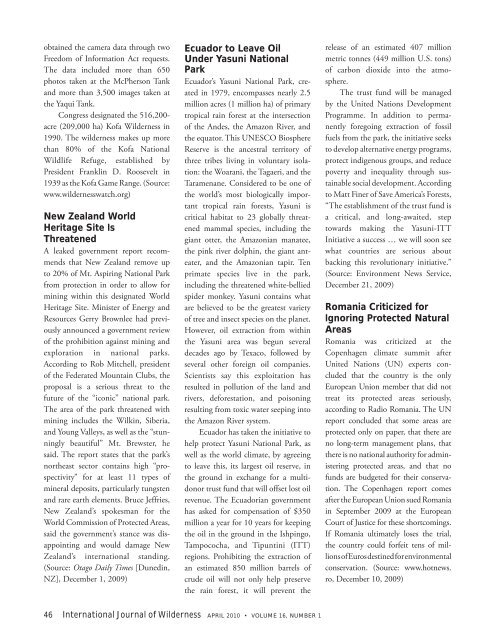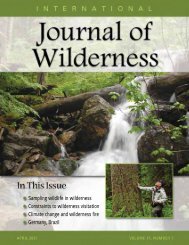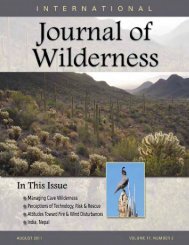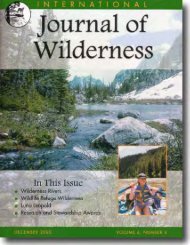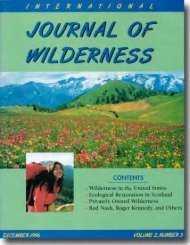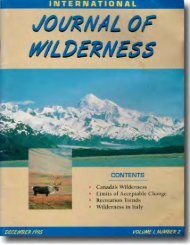Ten Tribes Reclaiming, Stewarding, and Restoring Ancestral Lands
Ten Tribes Reclaiming, Stewarding, and Restoring Ancestral Lands
Ten Tribes Reclaiming, Stewarding, and Restoring Ancestral Lands
Create successful ePaper yourself
Turn your PDF publications into a flip-book with our unique Google optimized e-Paper software.
obtained the camera data through two<br />
Freedom of Information Act requests.<br />
The data included more than 650<br />
photos taken at the McPherson Tank<br />
<strong>and</strong> more than 3,500 images taken at<br />
the Yaqui Tank.<br />
Congress designated the 516,200-<br />
acre (209,000 ha) Kofa Wilderness in<br />
1990. The wilderness makes up more<br />
than 80% of the Kofa National<br />
Wildlife Refuge, established by<br />
President Franklin D. Roosevelt in<br />
1939 as the Kofa Game Range. (Source:<br />
www.wildernesswatch.org)<br />
New Zeal<strong>and</strong> World<br />
Heritage Site Is<br />
Threatened<br />
A leaked government report recommends<br />
that New Zeal<strong>and</strong> remove up<br />
to 20% of Mt. Aspiring National Park<br />
from protection in order to allow for<br />
mining within this designated World<br />
Heritage Site. Minister of Energy <strong>and</strong><br />
Resources Gerry Brownlee had previously<br />
announced a government review<br />
of the prohibition against mining <strong>and</strong><br />
exploration in national parks.<br />
According to Rob Mitchell, president<br />
of the Federated Mountain Clubs, the<br />
proposal is a serious threat to the<br />
future of the “iconic” national park.<br />
The area of the park threatened with<br />
mining includes the Wilkin, Siberia,<br />
<strong>and</strong> Young Valleys, as well as the “stunningly<br />
beautiful” Mt. Brewster, he<br />
said. The report states that the park’s<br />
northeast sector contains high “prospectivity”<br />
for at least 11 types of<br />
mineral deposits, particularly tungsten<br />
<strong>and</strong> rare earth elements. Bruce Jeffries,<br />
New Zeal<strong>and</strong>’s spokesman for the<br />
World Commission of Protected Areas,<br />
said the government’s stance was disappointing<br />
<strong>and</strong> would damage New<br />
Zeal<strong>and</strong>’s international st<strong>and</strong>ing.<br />
(Source: Otago Daily Times [Dunedin,<br />
NZ], December 1, 2009)<br />
Ecuador to Leave Oil<br />
Under Yasuni National<br />
Park<br />
Ecuador’s Yasuni National Park, created<br />
in 1979, encompasses nearly 2.5<br />
million acres (1 million ha) of primary<br />
tropical rain forest at the intersection<br />
of the Andes, the Amazon River, <strong>and</strong><br />
the equator. This UNESCO Biosphere<br />
Reserve is the ancestral territory of<br />
three tribes living in voluntary isolation:<br />
the Woarani, the Tagaeri, <strong>and</strong> the<br />
Taramenane. Considered to be one of<br />
the world’s most biologically important<br />
tropical rain forests, Yasuni is<br />
critical habitat to 23 globally threatened<br />
mammal species, including the<br />
giant otter, the Amazonian manatee,<br />
the pink river dolphin, the giant anteater,<br />
<strong>and</strong> the Amazonian tapir. <strong>Ten</strong><br />
primate species live in the park,<br />
including the threatened white-bellied<br />
spider monkey. Yasuni contains what<br />
are believed to be the greatest variety<br />
of tree <strong>and</strong> insect species on the planet.<br />
However, oil extraction from within<br />
the Yasuni area was begun several<br />
decades ago by Texaco, followed by<br />
several other foreign oil companies.<br />
Scientists say this exploitation has<br />
resulted in pollution of the l<strong>and</strong> <strong>and</strong><br />
rivers, deforestation, <strong>and</strong> poisoning<br />
resulting from toxic water seeping into<br />
the Amazon River system.<br />
Ecuador has taken the initiative to<br />
help protect Yasuni National Park, as<br />
well as the world climate, by agreeing<br />
to leave this, its largest oil reserve, in<br />
the ground in exchange for a multidonor<br />
trust fund that will offset lost oil<br />
revenue. The Ecuadorian government<br />
has asked for compensation of $350<br />
million a year for 10 years for keeping<br />
the oil in the ground in the Ishpingo,<br />
Tampococha, <strong>and</strong> Tipuntini (ITT)<br />
regions. Prohibiting the extraction of<br />
an estimated 850 million barrels of<br />
crude oil will not only help preserve<br />
the rain forest, it will prevent the<br />
46 International Journal of Wilderness APRIL 2010 VOLUME 16, NUMBER 1<br />
release of an estimated 407 million<br />
metric tonnes (449 million U.S. tons)<br />
of carbon dioxide into the atmosphere.<br />
The trust fund will be managed<br />
by the United Nations Development<br />
Programme. In addition to permanently<br />
foregoing extraction of fossil<br />
fuels from the park, the initiative seeks<br />
to develop alternative energy programs,<br />
protect indigenous groups, <strong>and</strong> reduce<br />
poverty <strong>and</strong> inequality through sustainable<br />
social development. According<br />
to Matt Finer of Save America’s Forests,<br />
“The establishment of the trust fund is<br />
a critical, <strong>and</strong> long-awaited, step<br />
towards making the Yasuni-ITT<br />
Initiative a success … we will soon see<br />
what countries are serious about<br />
backing this revolutionary initiative.”<br />
(Source: Environment News Service,<br />
December 21, 2009)<br />
Romania Criticized for<br />
Ignoring Protected Natural<br />
Areas<br />
Romania was criticized at the<br />
Copenhagen climate summit after<br />
United Nations (UN) experts concluded<br />
that the country is the only<br />
European Union member that did not<br />
treat its protected areas seriously,<br />
according to Radio Romania. The UN<br />
report concluded that some areas are<br />
protected only on paper, that there are<br />
no long-term management plans, that<br />
there is no national authority for administering<br />
protected areas, <strong>and</strong> that no<br />
funds are budgeted for their conservation.<br />
The Copenhagen report comes<br />
after the European Union sued Romania<br />
in September 2009 at the European<br />
Court of Justice for these shortcomings.<br />
If Romania ultimately loses the trial,<br />
the country could forfeit tens of millions<br />
of Euros destined for environmental<br />
conservation. (Source: www.hotnews.<br />
ro, December 10, 2009)


